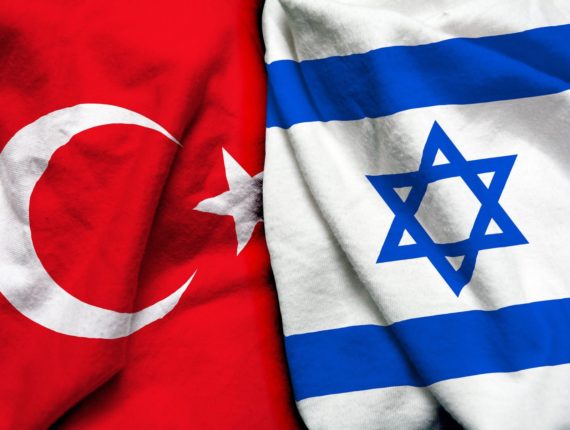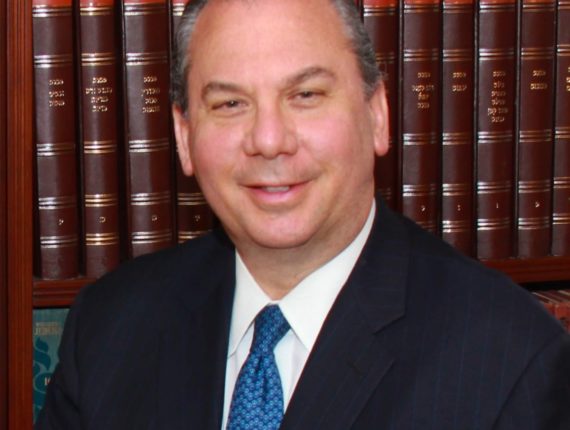
Daily Sabah
By: Meryem Ilayda Atlas
March 08, 2022

Turkey and Israel’s flags in this undated photo. (Shutterstock File Photo)
Israeli President Herzog’s visit to Turkey is expected to not only mend ties between the two countries but also have positive repercussions for the region and improve Turkey-U.S. relations, according to a key representative of the American Jewish community
Israeli President Isaac Herzog will pay a historic visit to Turkey on March 9-10 where he will meet with President Recep Tayyip Erdoğan in Ankara to mend the long-frozen ties between the two countries. At the meeting set to take place Tuesday, the two leaders will cover a wide range of issues, including energy, tourism, trade and regional security.
The last Israeli president to visit Turkey was Shimon Peres back in 2007. Later in 2010, Ankara withdrew its ambassador from Tel Aviv after the Israeli navy raided an aid flotilla, which included the MV Mavi Marmara. The flotilla was attempting to break the Israeli blockade to deliver humanitarian aid to Gaza. Eight Turkish citizens and a dual American and Turkish national were killed as a result of the raid. The negotiation efforts that began in 2016 were halted due to Israel’s deadly military offensive against the Palestinians in Gaza, which coincided with the official inauguration of the United States Embassy in Jerusalem on May 14, 2018 – following then-U.S. President Donald Trump’s decision to recognize the city as the capital of Israel and relocate the embassy.
Turkey’s Foreign Ministry has acknowledged that bilateral relations with Israel “once again entered a sensitive period as a result of the attacks and disproportionate use of force against Palestinian civilians who participated in the Great March of Return protests that began on March 30, 2018.”
As Herzog’s visit turns a new page in Turkey-Israel relations, Daily Sabah spoke with a key representative of the American Jewish community, Rabbi Marc Schneier, who contributed to the realization of the historic meeting along with senior Turkish officials. Schneier elaborated on Turkish-Israeli relations, President Herzog’s visit and its possible repercussions on Turkey’s relations with the U.S.
A senior rabbi at the Hampton Synagogue in Westhampton, New York – one of the most dynamic in the U.S. – Schneier is also an opinion leader who has been working to improve relations between key ethnic groups and religious communities for the past 30 years. He founded the Foundation for Ethnic Understanding in 1989, initially leading efforts to improve relations between America’s black and Jewish communities. For the past 15 years, he has been working to strengthen Muslim-Jewish relations worldwide.

Rabbi Marc Schneier
Schneier says he sees Herzog’s visit as a new beginning for Turkish-Israeli relations, Turkish-American ties and Jewish communities in the U.S. He is currently in Ankara and will attend the meeting between the two presidents.
The long deteriorating state of Turkish-Israeli relations – that resulted in a pause in diplomatic and political dialogue – was mostly blamed on right-wing politics in Israel and the termination of discussions of a two-state solution, which came to a breaking point and was cast aside during Prime Minister Benjamin Netanyahu’s term. Despite the fact that neither Turkey nor Israel has appointed an ambassador to their respective capitals, Herzog’s visit to Ankara is meaningful for both countries.
Turkey’s most recent close interactions with Israel began when Erdoğan called Herzog on July 12, 2021, to congratulate him on his election. This initiated the beginning of telephone diplomacy between the two countries. The leaders spoke again when Herzog called Erdoğan on Nov. 18, 2021, following the release of an Israeli couple who had been detained on charges of espionage in Istanbul. Erdoğan then called Herzog again on Jan.13, 2022, to express his condolences following the death of the Israeli president’s mother. The next month, Herzog called Erdoğan to wish him a swift recovery after the Turkish president tested positive for COVID-19.
Having played a crucial role in establishing contacts, beginning with the first phone calls, Schneier says that a new order is being established in the Middle East and around the world. Highlighting the shared history of Jews and Muslims as “the sons of Abraham,” the rabbi explained that among the Abrahamic religions, Judaism and Islam are the closest to one another.
The first contact Schneier established between Turkey, Israel and the Jewish-American community was the interfaith iftar dinner, which breaks the daylong fast during the month of Ramadan. The event was hosted by Turkey’s Ambassador to the U.S. Murat Mercan at the embassy residence in Washington last year.
Through their contact, Ambassador Mercan and Schneier then started to work to repair and facilitate Jewish-Muslim relations.
“Turkey’s improvement of relations with the U.S. is closely related to its improvement of relations with Israel in the region as a NATO and Western ally. In this regard, the Jewish-American community is also supportive of Turkey,” Schneier told Daily Sabah.
After the interfaith iftar meal, regular, warm contact was established between Turkey and Israel, the rabbi said, adding that Herzog’s visit is organized with the support of the Jewish community.
“If Turkey wants to restore relations with Israel, that would be a wonderful way to build relations between Turkey and the Jewish-American community. Supporting Israel is the only issue that both Republicans and Democrats agree on,” he said.
Schneier emphasized that it is essential for Ankara to establish good relations with Tel Aviv, not just for the sake of the state of Israel but also for other reasons, including economic development, regional peace and the Jewish-American community that supports these relations.
Historical ties
Due to its strategic location, Turkey has been home to different cultures and religions throughout history and has served as a center of interreligious cooperation and understanding. Many Sephardic Jews took refuge in the Ottoman Empire upon the invitation of Sultan Bayezid II during the Spanish Inquisition, which intensified in the late 15th century. Fleeing Jewish people found new homes in Constantinople, Smyrna and Salonika, modern-day Istanbul, Izmir and Thessaloniki, respectively. During World War II, some Turkish diplomats also played a direct role in helping save Jewish lives from the Holocaust. These two events are remembered to this day by both Jewish and Turkish societies and have created a special bond. Schneier explains that the memory of the safe haven provided to the Jews by the Ottomans and Turks lives on, adding that the historical coexistence between Judaism and Islam has molded this special relationship.
“From an American Jewish point of view, we recognize the important role that Turkey has played,” he said. Turkey is also the most significant Muslim member of NATO, besides its counterpart Albania. While Ukrainian President Volodymyr Zelenskyy has spoken of both Israel and Turkey playing mediating roles to resolve Russia’s invasion of his country, Schneier states that Turkey will also be a mediator and problem solver for many regional issues and conflicts.
As the world changes and historical relations ebb and flow over time, the criteria and relations between countries also change over the decades. For example, the relations countries like Saudi Arabia, the United Arab Emirates (UAE) and Bahrain seek to establish with the West and Israel differ from those sought 20 years ago.
Of course, with developing relations between Israel and Gulf countries, the first issue that arises is the resolution of the Israeli-Palestinian dispute. Turkey has a commanding role in discussing these issues and reaching a conclusion.
Lack of dialogue between countries is never desirable for the betterment of international relations. With the developing dialogue pointing to a win-win policy for both countries, maintaining this relationship is important for the ordinary citizens of Turkey and Israel as well as the countries’ historical ties. As such, Schneier describes Herzog’s arrival in Ankara and the resumption of diplomatic relations as a reconciliation between the two countries.
“Muslims and Jews have more in common than other faith communities, and more and more people look at it from a humanistic perspective rather than a state’s perspective,” he said.
A new chapter in interfaith diplomacy
Amid the changing world order, Israel has established relations of differing dimensions with Turkey, Arab countries, Azerbaijan and the Central Asian Turkic republics. Schneier says ties with countries that have yet to establish diplomatic relations with Israel, such as Qatar, which is set to host the 2022 FIFA World Cup, are developing and will continue to do so over time.
According to Schneier, the importance of focusing on the common historical origins of societies and drawing attention to the unique, familiar relations between Islam and Judaism – which other religious communities’ ties pale in comparison to – cannot be brushed aside or diminished. He says the Jewish-American community wants to build supportive relationships with these countries through this union to establish a new order in the Middle East, which is a great opportunity.
“One cannot dismiss the power of the interreligious channels,” he said.
“If this dialogue is provided for and continues, Turkey’s presence will be very, very helpful for understanding and solving Palestinian issues,” he urged.
Copyright © 2025 Foundation For Ethnic Understanding. All rights reserved. | Privacy Policy